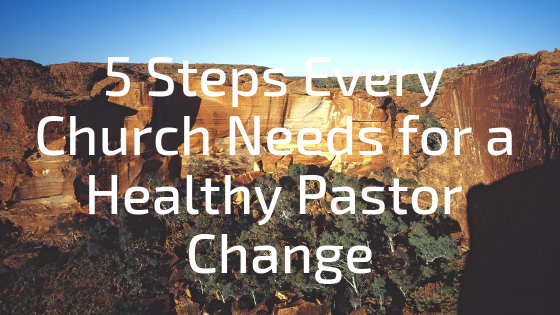Pastors are getting older. In 1992 the median age of a pastor was 44 years old. In 2017, that number had climbed to 54 years old. There are actually now more full time pastors who are over the age of 65, than under the age of 40 according to a 2017 Barna Group study. That’s troubling for a couple of reasons. First, it means there are less and less young people who are interested in pastoring. We’ll talk about this at another time. And second, it means that over the next ten years many churches will be transitioning to a new pastor and this is rarely done well.
We all know churches normally don’t handle change well. And when that change is the senior pastor, it can be devastating. A poor pastoral transition can set a church back years, and some never recover from it.
But…it doesn’t have to be that way.
There are steps we all can take to make that transition easier. They are steps that we all need to be doing right now, even if we’re not thinking about leaving the church anytime soon. Because you just never know what’s going to happen, so let’s take the steps to prepare our churches to survive without us.
- Create a plan. Don’t wait until the pastor leaves to start preparing for the next one. Go ahead and put a plan in place. Create a list of candidates. Will you hire from inside or outside? Who makes the decision on who to hire? Answer the important questions now, to save time and frustration later.
- Let others preach. Most pastors should be preaching somewhere between 35-44 weekends a year. Not only does this give them time off to rest, but it also gives others a chance to share their communication gifts. Your congregation will appreciate the change up. Now, this doesn’t mean you should let just anyone preach, but you should give others the chance who have the gift. Team teaching helps ease the transition from one pastor to the next.
- Build a healthy board. A healthy church board will protect the mission, vision, and values of the church, and provide guidance and accountability to the senior pastor. They should be an encouragement to the pastor, and not a thorn in the side. Churches with unhealthy boards are going to have a hard time finding pastors in the very near future. There will be too many opportunities available to them, and they’ll go where they’re allowed to lead.
- Establish a leadership team. A leadership team should be responsible for the day-to-day decisions of the ministry. They should work under the senior pastor’s direction to help accomplish the vision. This team is typically made up of high level ministry leaders and key influencers in the church. If you think your church board is your leadership team, you have a big problem. That’s not healthy or wise.
- Develop systems. Systems are what you do and how you do it. Think of them as the user manual for your church. What happens when a first-time guest visits your church? Why system do you have in place? What happens with the offering? Who counts it, who enters it, and who takes it to the bank? The more systems you have, the less confusion you have when transitions take place.
These should get you started, but what else needs to be added? Leave your answers in the comments below, and if I can ever help you put any of these things into practice please reach out to me through my contact page. I’d love to help.





Trevor Stearns
Another great option that is being applied across Canada and elsewhere is the hiring of a transitional pastor on a short term 1-2 year basis who is skilled in the dynamics of pastoral transition and is able to assist the church in creating a more effective platform for the changes that may need to occur to allow for a healthy transfer of pastoral authority to the new incoming pastor. Also many transitional pastors are equipped to help in the search process which very few church boards or leadership teams are equipped to do on their own. Check out a list of pastors equipped for this role at Outreach Canada.
admin
Trevor,
Thanks so much for the comment and info. That sounds like a great idea.